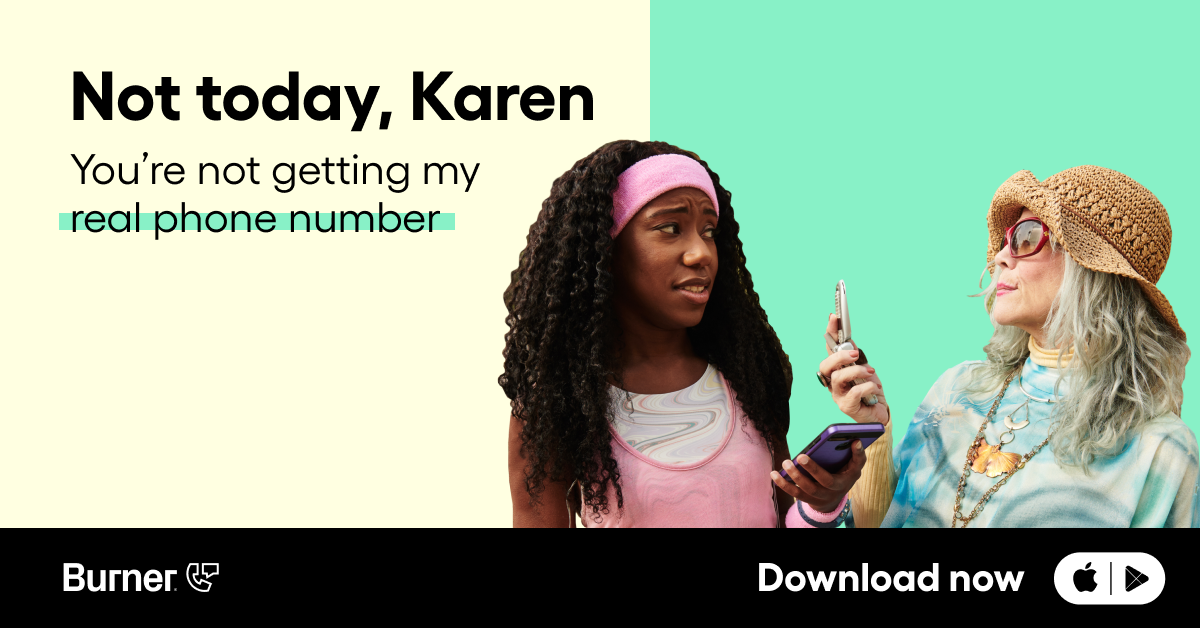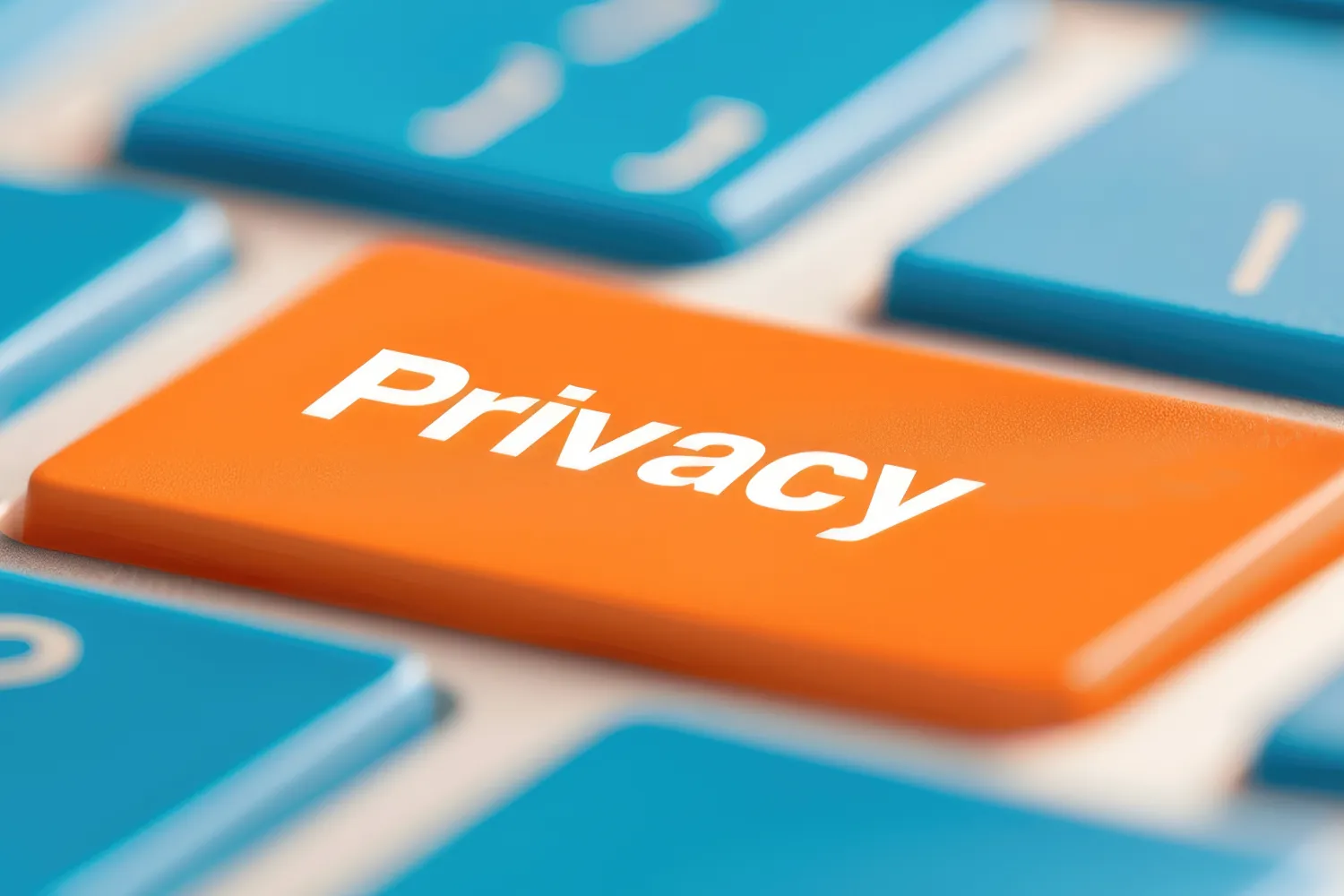Key Takeaways:
- To an extent, you’ll never achieve true anonymity online. It’s just not possible anymore. However, you can improve your privacy to protect yourself from the more significant downfalls of constant data scraping and tracking.
- You can better protect yourself by changing your passwords, being mindful of the information you share online, removing apps and extensions you don’t use, using a VPN, and more.
- You can also utilize a burner phone number to use when creating online accounts.
Remember when you were a teenager, first discovering social media and the internet? Remember rolling your eyes at your parents’ pearl-clutching paranoia about privacy? Well, unfortunately, they were kind of right.
The reality is that every website you visit, every app you download, and every game you play is using you for your data. The real goal isn’t providing you with a service or with entertainment — it’s to learn as much about you as possible so that they can sell things to you.
And that’s the best-case scenario. The worst case scenario? Scammers and other malicious third parties gain access to your personal info, too. Online privacy is important, so let’s dig in.
What Do You Need To Know About Online Privacy?
One key thing to know about online privacy is that it’s a spectrum. To an extent, you’ll never achieve true anonymity online. It’s just not possible anymore. However, you can improve your privacy to protect yourself from the more significant downfalls of constant data scraping and tracking.
The other key things to keep in mind are the specific ways in which your data is collected. Being aware of these factors will make it easier to minimize what you share.
- Browsing data. Every website tracks and analyzes every single page view and interaction made on its domain.
- Mobile apps and accounts. You may know to skip out on checking that ‘please send me tons of annoying emails’ box, but you’re still giving away your name and important contact information, among other things like your birthday, gender, and location.
- Loyalty cards and accounts. Look, we all love a good discount. But loyalty cards and accounts aren’t actually free. You’re paying for those points by providing companies with an easy way to collate your data and habits into a sales strategy.
- Social networks. Like all of these other strategies, social networks offer companies basic info about your behavior, interests, and preferences. But it’s not just about what you do. It’s also about what you post, making social media a key window into your personal information.
All of this is standard, if annoying. But the dark side of all this data collection is simply that it exists, which means it can be accessed by hackers and scammers and used against you.
If you want to minimize the access corporations and advertisers have to you and reduce the risk of malicious third parties accessing your personal information, there are some easy ways to protect yourself.
1. Don’t Get Lazy With Your Passwords
Yes, it’s annoying to include a capital letter, a lowercase letter, a number, a symbol, two hieroglyphics, and a joke in every password. But it does provide an extra layer of protection for your accounts.
Make sure all of your passwords are distinct and ideally, random. Even better, enable two-factor authentication.
2. Say Less
Be mindful about the information you’re putting out into the world.
- Mention your childhood dog’s name? There’s a security question answer.
- Post about your upcoming vacation? Now someone knows your house will be empty.
- Share a screencap of your phone’s home screen? A scammer knows what banking app you use.
This doesn’t mean you have to disappear completely. But when in doubt, less is more. If the information isn’t there, no one can exploit it.
3. Manage Your Digital Footprint
As we’ve mentioned, it’s essentially impossible to achieve total online anonymity. But you can take steps to manage and minimize your digital footprint. Reach out to data brokers like Whitepages and request that they remove your information.
Google your name, phone number, and email addresses and see what comes up, too. If a website is collecting your information and offering to sell it, you can request that it be removed, or at least ask Google to remove the search result.
4. Remove Apps and Extensions You Don’t Use
If you’re someone whose home screen looks like a digital bomb went off, it’s time to set a reminder for a weekly clear-out. Remove any apps or browser extensions you don’t actually use. Otherwise, they’re just taking up memory and collecting your data, without providing any benefit to you.
5. Consider Using a VPN
To stop websites from collecting your browsing data and online activity, consider using a VPN. A VPN, or virtual private network, encrypts your data and hides your IP address. This creates a secure connection between your device and the internet and prevents third parties from accessing your browsing data.
With Burner Premium, you can access our VPN with a strict no-logging policy, so we don’t even know what you’re doing online. Which, frankly, is how we prefer it.
6. Expand Your Definition of ‘Private Information’
We share our phone numbers all the time, so much so that we hardly think about them as being private information. But your number should be private! It connects directly to information like your name, family, location, and any other accounts attached to that number.
Creating a custom phone number for things like account sign-ups, interactions with strangers, or verification codes puts some distance between scammers and your personal data. If you start getting scam calls or texts, simply delete the number and move on. No harm, no foul. No privacy breach.
FAQs
How do I lock my personal information on the internet?
Create passwords that are at least 15 characters long. Use a combination of uppercase letters, lowercase letters, numbers, and special characters in your passwords. Consider using a passphrase consisting of three or more random words, substituting numbers and symbols throughout for added security.

Can hackers see my password?
Even if you practice good password habits, your password could still be exposed in a breach. This is one of the main ways hackers get old passwords. When a breach occurs, old passwords are often part of the stolen data. Hackers can then use these to access accounts you haven't updated with new passwords.
How will I know if I'm hacked?
There are many telltale signs of a digital hack, including:
- Your email has been sending messages you didn't create.
- Your passwords have changed without you knowing.
- Your device is installing the software you didn't authorize.
- You get fake antivirus messages asking you to install.
- Your personal data is leaked.
Online Privacy Made Simple
The World Wide Web doesn’t have to be the Wild West, even if it feels like it sometimes. By taking control of your online privacy, you can protect yourself from scams and ensure that your private information stays, well…private.
Try Burner today and take your online privacy to the next level.
Sources:
Top Tips for Staying Secure Online | National Cyber Security Centre
Your VPN’s ‘no-log’ Policy: What It Is and Why It Matters | PC World
Find and Remove Personal Contact Info In Google Search Results | Google Search Help




.svg)
.svg)

.svg)
